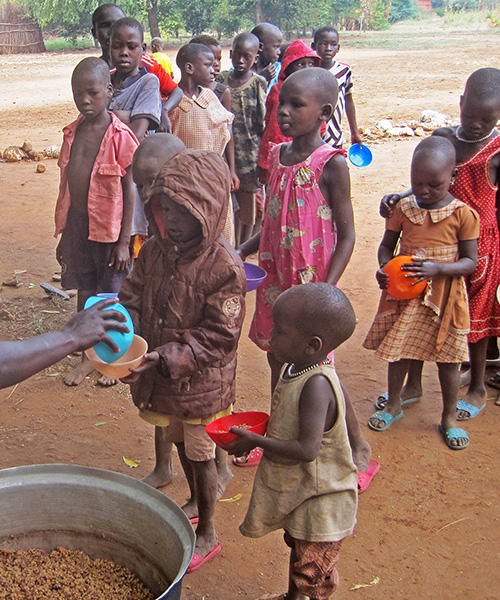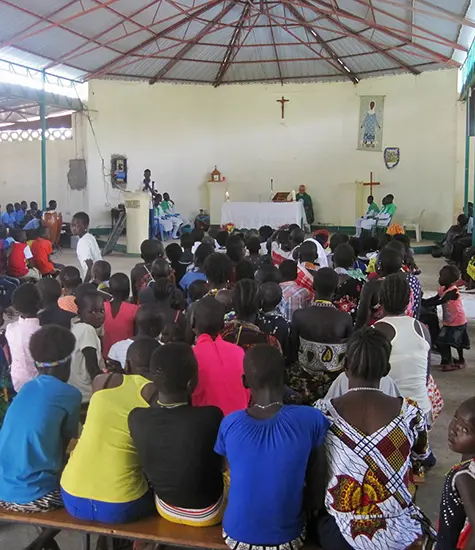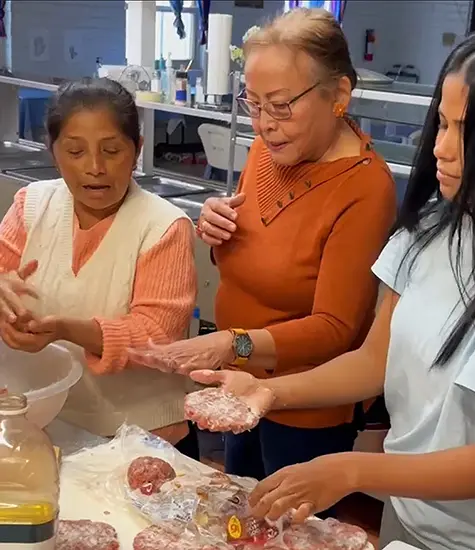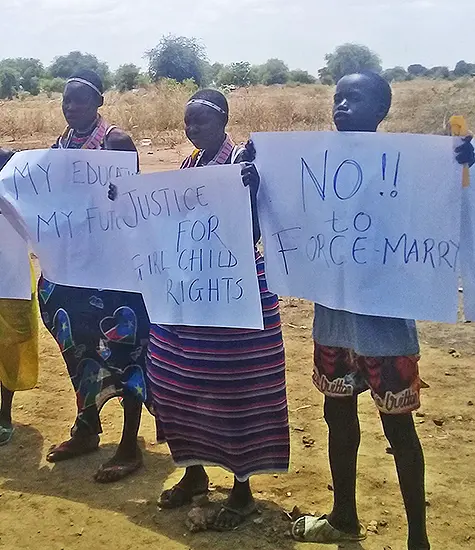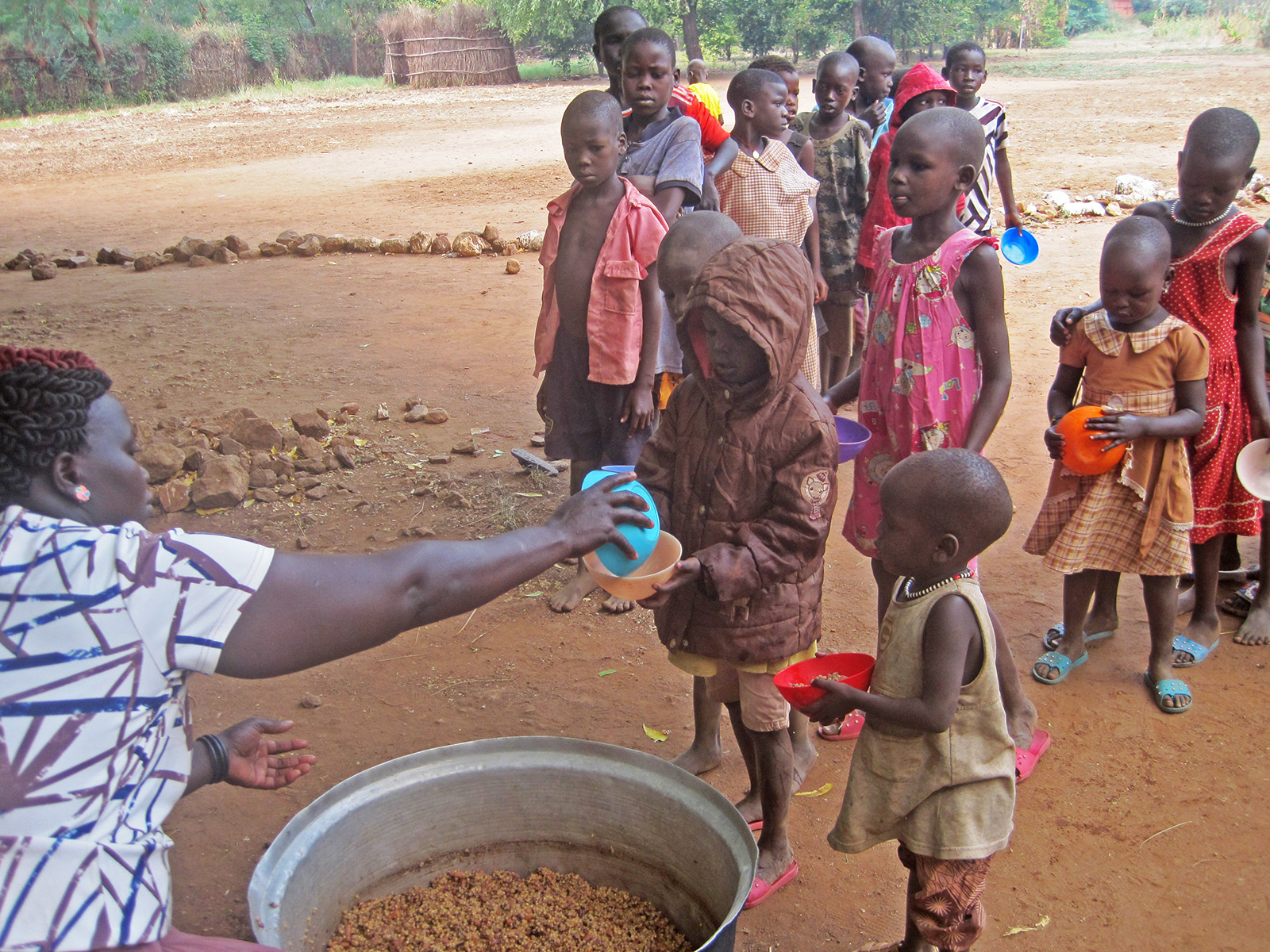
Lunchtime at the Kuron Peace Village Nursery
Jesus fills his parables with symbolism and nuance. At first glance, today’s Gospel reading (Lk 16:19-31) might seem to say that if you are rich, you will go to hell, and if you are poor, you will go to heaven. But Jesus had a much deeper message. It is up to us to enter into the meanings and nuances of each parable to find it.
This parable makes us think about life in a different light. Lazarus was a man with no hope and full of suffering. Yet, he did not protest. He was patient and trusted God. The rich man apparently has no concern for the situation of Lazarus even though he knew him by name.
Jesus teaches in a way that can make people uncomfortable. Ancient cultures viewed wealth as a blessing from God. Those who were poor were seen as cursed by God and to be shunned. However, Jesus said, “The last shall be first,” “How difficult it is for the rich to enter the Kingdom,” “Blessed be the poor,” and now today’s reading about rich and poor. Jesus has a way of shocking our souls, showing us to ourselves, and then allowing us to decide.
Most people will deny they are rich. No matter how much wealth we have, it never seems to be enough. This Sunday’s Gospel reading seemingly points out the contrast between rich and poor, a life of luxury versus a life of suffering. The parable does not specify why Lazarus was favored and the rich man was not. That is for us to contemplate.
By the way, Jesus spoke of hell more than any other biblical person. This parable teaches that hell is real and it is a possibility for us.
Previously, Jesus had said, “No person can serve two masters … You cannot serve God and wealth.” For sure, there are people who are wealthy who love God and share what they have. On the other hand, there are poor people who are consumed by getting money and have no love for others including God.
In this parable, the rich man is not in hell just because he was rich. The poor man is not in Abraham’s embrace just because he was poor. Something else is going on here. It seems what Jesus alludes to in this parable is how we should be aware of and behave toward those around us.
One interesting thing about this moral tale is that from hell the rich man (with no name) knows the name of the poor man as he calls Lazarus by name. He no doubt knew him on Earth and yet did nothing to help him. Being Jewish, the rich man should have been well aware of Deut. 15:11: “Open your hand to the poor and needy neighbor in your land.” The rich man remains self-centered even in hell, only thinking of himself and his immediate family.
If we don’t practice the Christian faith and charity, we cannot be among the chosen people in heaven. We need to constantly reflect. Are we faithful followers of Jesus? Do we really practice charity based on our faith and hope in God the Father and his Son Jesus Christ?
How often do we fail to see and help the poor who are at our gates/doors/borders or in our communities? Do we only focus on our own life? What are we going to do with the Christian knowledge we have? Do we become blind to those in need and turn away or fail to “see” them as Jesus asks so many times in the Gospels? Can’t we do something?
This parable teaches us that doing nothing is not God’s will.
Personally, I have come to understand through the wisdom of the Holy Spirit that all the people around me, rich and poor, are God’s children and I am called to serve them. I am urged to be in mission in South Sudan, one of the poorest and most dysfunctional countries on Earth. I want to open my gate to the Lazaruses of South Sudan. I want to recognize the suffering around me. I want to treat them with dignity and respect. It is through these souls that we will all receive salvation.
Maryknoll Lay Missioners has offered me a unique opportunity to come to South Sudan. I didn’t come for the rich and powerful. I came for the Lazaruses of this country. Through deep reflection on this parable, I can discern God’s will and maybe it is not too late to enter heaven.
Scripture reflection for the Maryknoll Office for Global Concerns, Sep. 25, 2022 (26th Sunday in Ordinary Time).
Click here for more scripture reflections from Maryknoll lay missioners.

